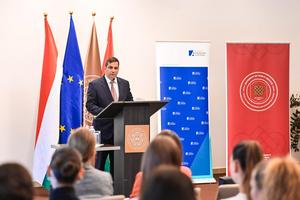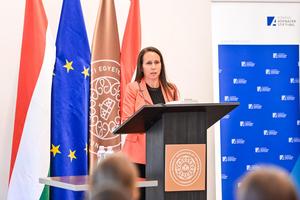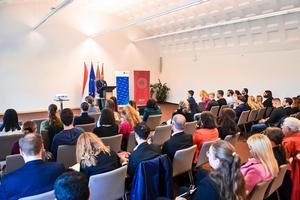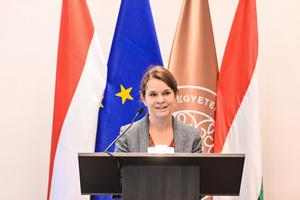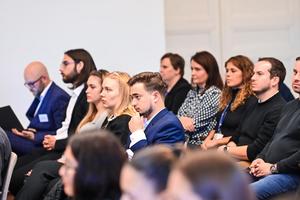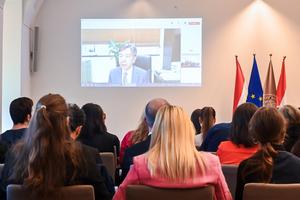Under the title "War and Peace in the 21st Century: New Technologies and International Law," the Department of International Law at the Faculty of Public Governance and International Studies (FPGIS) of Ludovika - University of Public Service (LUPS) organized its third international conference on October 4. The conference aimed to explore the intersections between technological advancement and international law.
In his opening speech, Rector Gergely Deli emphasized that hosting the conference reflects LUPS's objectives to strengthen its international presence and recognition, particularly through fostering international partnerships and relations. He highlighted the necessity of regulating new technologies, such as artificial intelligence, which the international community is increasingly recognizing. The rector noted the importance of academic discussions on how to protect individuals and society as a whole from the negative impacts of these emerging technologies. He added that the organizers aimed to provide a platform for scholars and practitioners to discuss the current state of emerging technologies, from managing the impacts of artificial intelligence to ensuring that the final frontier of space does not become a battlefield.
Réka Varga, Dean of FPGIS, remarked that the event's participants had gathered to deeply explore some of the most critical and pressing issues facing the world today. She pointed out that the global order is undergoing change, and the spread of technological advances requires an adaptation of the international legal framework that supports it. She cautioned against divergent regulatory approaches among states or regions, which could create perceived or real advantages for certain countries. With technological progress comes a need to proactively develop thoughtful regulations for new technical fields. Such conferences are essential to establish a dialogue that, by examining the current situation and future possibilities, could lay the groundwork for future regulations.
Keynote speakers Nele Verlinden, Legal Advisor to the International Committee of the Red Cross, and Jaemin Lee, Professor at Seoul National University, laid the foundation for an in-depth discussion on the intersections of technology and international law. They emphasized that the rules and norms of international law must always be upheld. The proliferation of new technologies raises complex questions and presents new challenges that necessitate regulatory adjustments to minimize potential adverse effects while maximizing the benefits of these technologies in both national and international law. Beyond applying existing regulations to new technologies, there is a need to establish frameworks within international law that adequately address these challenges.
The conference continued with two sessions. The first, led by Melinda Szappanyos, Assistant Professor at LUPS, focused on new technologies and the international regulation of outer space. Rachita Agrawal from Guru Gobind Singh Indraprastha University in India opened the discussion by presenting the strategic significance of space technologies in modern military operations. Mónika Ganczer from Széchenyi István University highlighted the increasing role of non-governmental organizations in space activities. Mátyás Kiss from the University of Pécs examined issues of state sovereignty in cyberspace, while Gábor Sulyok from Széchenyi István University discussed the role of the United Nations Security Council in addressing space-based threats. In the final presentation, Zoltán Turbék from Hungary's Permanent Mission to the UN in Geneva focused on the international regulation of artificial intelligence systems in light of recent regulatory initiatives.
The second session, chaired by Balázs Vizi, Associate Professor at LUPS, centered on the international humanitarian and criminal law aspects of new technologies. Krzysztof Kazmierczak from the University of Lodz in Poland examined the role of smart devices in conflict zones and how their use can blur the distinction between civilians and combatants. Bence Kis Kelemen from the University of Pécs explored the legal status of hacking in armed conflicts, noting that some cyberattacks could be considered direct participation in hostilities. Anna Dóra Kovács from LUPS provided a comparative analysis of AI regulations in the European Union, the United States, and China. Tamer Morris from the University of Sydney in Australia discussed the risks and civilian impacts of information warfare, and Maria Varaki from King’s College London examined the potential of artificial intelligence in both inciting and preventing conflicts.
Text: Dalma Wéber, Tamás Csaba
Photo: Dénes Szilágyi
